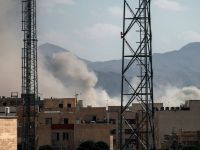Prime Minister Salim Hoss called Monday for measures against a satellite television station owned by his predecessor, Rafik Hariri, which he accused of harming "higher national interests."
Hoss asked Information Minister Anwar al-Khalil in a public letter to "take steps to oblige Future TV to exercise self-censorship, in consultation with the syndicates of the press and editors and the Audiovisual National Council."
Future TV "is broadcasting a distorted and misleading picture which could inflict the greatest harm to the national economy, thus to the highest national interest and the interests of our nationals," he said.
Hoss said he had received "in the past few days a flood of phone calls from Jeddah, Riyadh and a number of Gulf countries, all of which protested the campaign launched by Future TV."
The letter said Future TV was "showing a dark and repulsive picture for narrow internal political objectives."
"They told me that many people who were planning to come to Lebanon backed down because of this negative and exaggerated depiction of the reality in Lebanon," he said.
Future TV declined comment on the letter.
Lebanon counts on returns from the summer touristic season, particularly from the rich Arab Gulf nationals who traditionally spend their vacations in sea or mountain resorts, to revive its stagnating economy.
There are six television stations authorized to broadcast political programs in Lebanon.
When in office Hariri drastically reduced the number of private television and radio stations in 1996 by adopting a new media law.
Hariri, who was prime minister between 1992 and 1998, also took steps against the leading LBC television station, forcing it to stop broadcasting political programs by satellite after a virulent talk-show with one of his staunchest opponents, MP Najah Wakim.
But current Justice Minister Joseph Shaoul, who was then president of the State Council, quashed the move and forced Hariri to back down on his decision - (AFP)
© 2000 Al Bawaba (www.albawaba.com)







